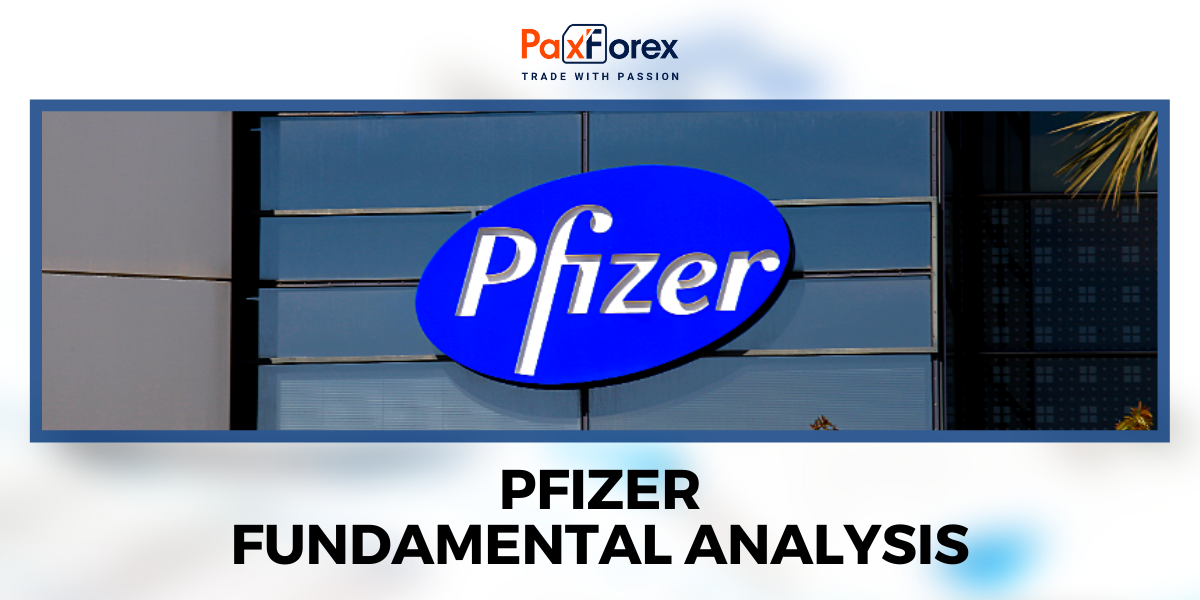
Source: PaxForex Premium Analytics Portal, Fundamental Insight
Pfizer has been struggling lately, with its stock down approximately 11% this year despite posting reasonable earnings. While broader markets have performed well, investor sentiment around Pfizer has turned cautious, primarily due to fears of significant challenges that may impact its $145 billion valuation in the long term. This raises an important question: is Pfizer headed for deeper trouble, or are investors underestimating its potential?
Pfizer enjoyed unprecedented success during the pandemic, driven by the global demand for its COVID-19 vaccine and antiviral pill. In 2022, its revenue soared past $100 billion, thanks to these breakthrough products. However, the waning demand for COVID-related treatments has shifted investor focus to Pfizer’s future growth opportunities beyond the pandemic. For instance, sales of its Comirnaty vaccine plummeted 66% year-over-year to under $2 billion during the first nine months of 2024.
Despite this steep decline, Pfizer managed to grow its total revenue by 2% to $45.9 billion in the same period, highlighting the resilience of its other business segments, including specialty care and oncology. This performance indicates that while COVID-related revenues may dwindle further, Pfizer's diverse portfolio could help it weather the storm.
Investor apprehension has kept Pfizer's forward price-to-earnings (P/E) ratio below 9, signaling a heavily discounted valuation. Concerns stem not only from declining vaccine sales but also from broader geopolitical uncertainties and shifting public attitudes toward vaccines. While these risks are significant, it’s likely that they’ve already been factored into the stock's current price, offering a potential margin of safety for new investors.
Pfizer’s strategy hinges on diversifying its revenue streams, with oncology emerging as a key growth driver. The company’s $43 billion acquisition of Seagen, a leader in antibody-drug conjugates, underscores its commitment to bolstering its cancer treatment portfolio. These targeted therapies could position Pfizer as a frontrunner in the oncology space, potentially offsetting revenue losses from patent expirations and COVID-related products.
Another exciting avenue for growth lies in the weight-loss market. Pfizer is developing a once-daily pill, danuglipron, which has shown promising results in early trials. If approved, it could be among the first oral weight-loss treatments, unlocking a multibillion-dollar market for the company. This innovation could serve as a major catalyst for long-term growth.
With 108 drug candidates in development as of late October, Pfizer continues to invest heavily in its pipeline. While uncertainties remain, including challenges with patent cliffs and competition in key markets, the company’s ongoing innovation and strategic acquisitions provide reasons for optimism.
For risk-tolerant investors, Pfizer's discounted stock price offers an appealing opportunity. Its robust dividend, coupled with the potential for significant long-term gains, makes it an attractive option for those willing to navigate near-term uncertainties. However, risk-averse investors may find the current volatility too unsettling.
Pfizer’s future may be less certain than during its pandemic-era peak, but it is far from a company in crisis. By focusing on oncology, weight-loss treatments, and a diversified drug portfolio, it is positioning itself for sustainable growth. For investors seeking undervalued stocks with strong potential, Pfizer could be a compelling choice, particularly if its strategic bets pay off in the years ahead.
As long as the price is above 25.00, follow the recommendations below:
- Time frame: D1
- Recommendation: long position
- Entry point: 25.73
- Take Profit 1: 27.00
- Take Profit 2: 29.00
Alternative scenario:
If the level of 25.00 is broken-down, follow the recommendations below:
- Time frame: D1
- Recommendation: short position
- Entry point: 25.00
- Take Profit 1: 24.00
- Take Profit 2: 23.00













